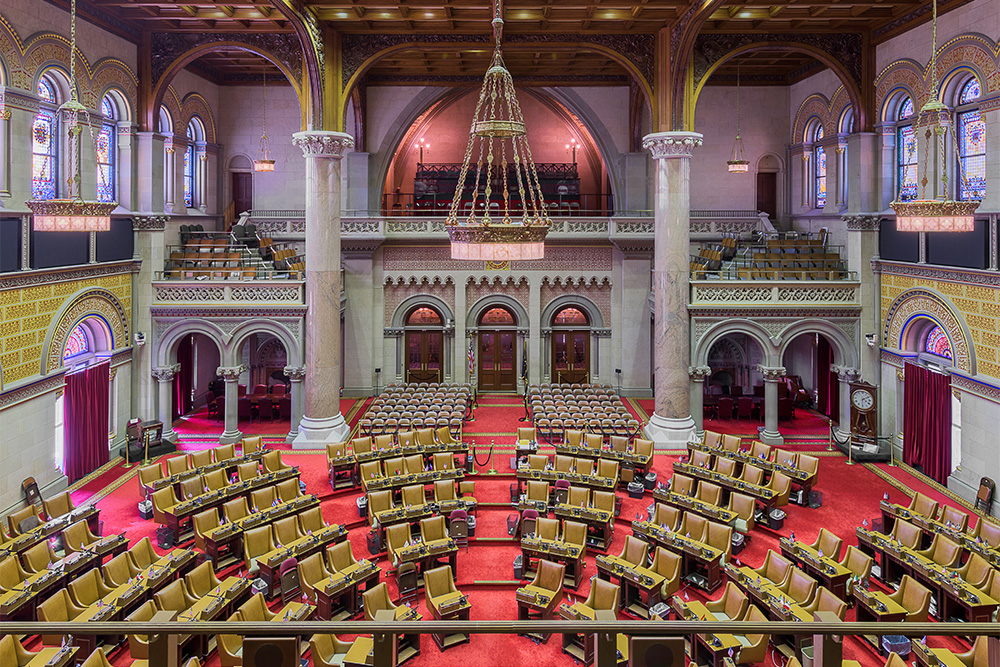
Three Ways the New York Legislature Can Advance an
Affordable and Equitable Clean Energy Transition for New York
By Nicole Abene, Senior NY Legislative & Regulatory Manager, BDC
Recently I submitted written testimony on behalf of the Building Decarbonization Coalition to the New York Committee on Environmental Conservation for their Joint Legislative Public Hearing on the 2024 Executive Budget Proposal.
In this testimony, I described how, over the past two years, New York has advanced nation-leading efforts to decarbonize the state’s built environment by passing the Utility Thermal Energy Networks and Jobs Act and the nation-leading All-Electric Buildings Act.
These are incredible steps toward a decarbonized future, but there is more left to do. Specifically, New York needs to implement policies that further empower its utilities, unions, universities, and residents to transform how the state heats and cools its buildings. Policies that will enable New York to decarbonize its built environment at a scale that makes energy bills more affordable, fortify its clean heating and cooling infrastructure with union jobs, and create nationally-recognized models for advancing the clean heat market.
These policies, which the New York State Legislature is currently considering for inclusion in its Fiscal Year 2025 Budget, include the NY HEAT Act, funding for Thermal Energy Networks (TENs) at SUNY campuses, a renewed commitment of $200 million to continue to fund the EmPower+ low-income home retrofits program, and new funding for pre-electrification measures that are necessary prerequisites to the EmPower+ program’s offerings.
NY HEAT: Lower Bills, Cleaner Heat
The Legislature can help decrease energy costs for New Yorkers by addressing the growing burden energy bills are placing on NY families by including this critical affordability measure in its FY 2025 Budget. Without the NY HEAT Act, the Public Service Commission (PSC) is constrained in its ability to direct utilities toward clean energy solutions and away from spending ratepayer money on replacing aging pipe, costing $3-$6 million per mile of pipe replaced, a practice that could end up costing ratepayers $28 billion by 2050 if business as usual continues. NY HEAT would amend the obligation to serve gas, opening up a pathway to advance clean neighborhood-scale building decarbonization solutions, like Thermal Energy Networks.
In addition, the current cross-subsidy, or “100-foot rule”, costs existing customers $200 million per year to defray the cost of extending gas lines to new customers. Eliminating this wasteful gas line expansion subsidy will help stop gas utility bill increases and could shift funds to support clean heat and cooling technologies. Capping energy utility bills at 6% will save the most energy-burdened New Yorkers on their utility bills.
SUNY Thermal Energy Networks: Reduce Campuses’ Energy Spending and Emissions
Last year, the Legislature provided $30 million to SUNY University at Albany as part of the adopted budget to replace two fossil-fuel-fired chillers with a high-efficiency electric chiller and a heat recovery/heat pump chiller. This investment will complete the electrification of 100% of SUNY Albany’s air conditioning, reduce its annual carbon emissions by 16%, and advance that campus’s Thermal Energy Network project.
The Legislature can build on this success and further lay the framework for a decarbonized SUNY system by allocating funding for emissions-free TEN at two other SUNY campuses that are ready to take the next step toward decarbonization — $40 million for a TEN at Purchase College, SUNY and 50 million for a TEN at the South Campus of the University at Buffalo, SUNY.
Purchase College would be able to reduce over 65% of its greenhouse gas emissions if a Thermal Energy Network were developed to provide clean heating and cooling for its campus. At SUNY Buffalo’s South Campus, a Thermal Energy Network would provide for a 30% reduction in energy usage while providing heating within the existing electrical capacity of the campus’s electrical service. Both projects would provide increased resiliency, comfort, and energy efficiency for these campus communities.
EmPower+ – Affordable Clean Energy Heated Homes For Low-Income Families
By renewing $200 million in funding for the EmPower+ low-income home retrofits program, as well as providing new funding for the pre-electrification measures that are necessary prerequisites to EmPower+ offerings, the Legislature can help low-income New Yorkers switch to clean heating technologies while reducing their energy costs.
Continued EmPower+ funding is critically needed for successful implementation of New York’s nation-leading Climate Friendly Homes initiative, which set the target to ensure that one million homes will be electrification-ready and one million homes electrified by 2030, prioritizing investments in underserved communities.
In addition, low- and moderate-income (LMI) households spend a far larger proportion of their income on energy bills and continue to face disproportionate barriers to weatherizing, electrifying, and adopting cleaner technologies. Many live in older buildings that require health and safety remediation to be electrification-ready and lack the ability to finance this necessary work. Without sufficiently resourced programs, these households will continue to live in potentially unhealthy housing, be more vulnerable to the negative effects of climate change, and will be left facing rising energy bills and poorer health outcomes.
Minimal uptake of EmPower+ and electrification programs for LMI households, especially among those living in the oldest housing stock, will continue until pre-weatherization and pre-electrification measures are funded as part of New York’s home retrofit programs.
A More Affordable, Healthier, and Greener New York
By passing NY HEAT, funding two Thermal Energy Network projects at SUNY campuses, and renewing EmPower+ funding while complementing the program with new funding for essential pre-electrification remediation measures, the Legislature will move New York forward on the path to an equitable clean energy transition that tackles climate change. And it can do this while retaining and expanding middle-class union careers and lowering energy costs for the state’s families, making New York a more affordable, healthier, and greener place to live and work.
Want to stay up to date on building decarbonization policy and other developments in New York and across the rest of the United States? Sign up for BDC’s monthly newsletter, and follow us on X, Threads, and LinkedIn!
